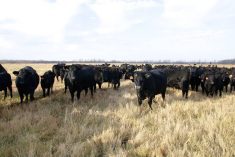Much work has been done on how to prevent and manage animal disease outbreaks.
The Animal Health Emergency Management Project has developed strategies, and Alberta Beef Producers released a handbook in 2018.
A foreign animal disease outbreak such as foot-and-mouth disease (FMD) or African swine fever could be particularly devastating.
This article will focus on FMD because it can affect all cloven hoof animals and hit several livestock sectors. We really are all in this together.
FMD is caused by a very contagious virus that luckily has entered Canada only once, in the 1950s. Fortunately it was in Saskatchewan in the dead of winter so spread was very limited before it was controlled.
Read Also

Trump’s tariffs take their toll on U.S. producers
U.S. farmers say Trump’s tariffs have been devastating for growers in that country.
It can be spread between cattle, bison, sheep and goats and potentially wildlife such as deer and elk. Most production animals on our farms are susceptible.
We all know how contagious COVID 19 is, and it is classified as 1.2-1.5, meaning that every person with COVID-19 would infect 1.2 to 1.5 other people.
FMD is rated at 10 to 40 in a very short period of time, making it an extremely scary disease if it got into a population of farm animals.
So what can we do collectively to help prevent it from entering Canada?
The virus can persist in tissue such as bone marrow or organs, and one of the most likely means of entry is smuggled meat products.
An ever-heightened vigilance at ports of entry and stiff fines for people smuggling meat will help. As well, the canine units at ports of entry that are used to detect narcotics and fruit can also be invaluable tools for catching meat products. These dogs are specialists and fantastic at what they do.
More effort and surveillance also needs to be done with human entry into Canada.
It angers me when border security does a great job confiscating illegally imported meat and the smugglers only get a slap on the wrist.
Further decontamination and biosecurity measures and questioning need to be done with visitors from countries where FMD is endemic. This is not that hard to figure out.
We are lucky this fragile virus has a hard time surviving long flights and that visitors arriving from FMD zones often don’t travel directly from the airport to farms.
FMD does not result in high mortality, but it significantly affects production, such as weight loss, milking problems and difficulty walking and eating.
It has been said that no sophisticated animal production system can co-exist with FMD. As a result, governments around the world are expanding their banks of vaccine.
The problem is that there are about 20 different strains of the virus and very little cross protection between vaccines. Clostridia vaccines have generally seven to 10 strains of the clostridial organisms. The FMD strains are in individual vaccines, so countries would have to keep 20 different strains.
The specific strain is identified when a diagnosis is made, which takes about 24 hours, and vaccinations would begin within a perimeter of the affected animal/herd. Fortunately immunity develops quickly once the strain is identified.
It’s important that everyone in the industry with exposure to cattle, including producers, veterinarians, marketers and auction workers, be on the lookout for unusual lameness or slobbering at the mouth.
Good photos are available showing what FMD looks like in different species. Vesicles or blister-like lesions can occur in the mouth, tongue and around the coronary band.
Things can happen very quickly, so we can’t stick our heads in the sand. A big outbreak could potentially have a massive cost.
An alert producer can notify an astute veterinarian, who can stop livestock movement and ask the Canadian Food Inspection Agency to prove or refute the existence of FMD.
Regional areas will be vaccinated if the disease’s presence is confirmed, likely in a ring surrounding the initial herd.
The public won’t tolerate what happened in the British outbreak, which resulted in the mass destruction of many livestock.
Vaccination can help get ahead of the outbreak, minimize the spread and eventually allow officials to focus on eradication.
Diseases such as FMD or swine vesicular disease have become a global challenge, which can significantly affect trade and close borders.
A false alarm is better than procrastination.
Roy Lewis works as a veterinarian in Alberta.















